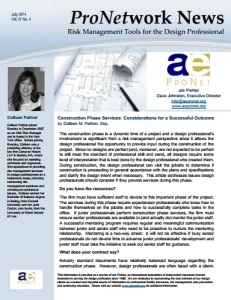 The construction phase is a dynamic time of a project and a design professional’s involvement is significant from a risk management perspective since it allows the design professional the opportunity to provide input during the construction of the project. Since no designs are perfect (and, moreover, are not expected to be perfect to still meet the standard of professional skill and care), all designs require some level of interpretation that is best done by the design professional who created them. During construction, the design professional can visit the jobsite to determine if construction is proceeding in general accordance with the plans and specifications and clarify the design intent when necessary. This article addresses issues design professionals should consider if they provide services during this phase.
The construction phase is a dynamic time of a project and a design professional’s involvement is significant from a risk management perspective since it allows the design professional the opportunity to provide input during the construction of the project. Since no designs are perfect (and, moreover, are not expected to be perfect to still meet the standard of professional skill and care), all designs require some level of interpretation that is best done by the design professional who created them. During construction, the design professional can visit the jobsite to determine if construction is proceeding in general accordance with the plans and specifications and clarify the design intent when necessary. This article addresses issues design professionals should consider if they provide services during this phase.
Do you have the resources?
The firm must have sufficient staff to devote to this important phase of the project. The services during this phase require experienced professionals who know how to handle themselves on the jobsite and how to successfully complete tasks in the office. If junior professionals perform construction phase services, the firm must ensure senior professionals are available to (and actually do) mentor the junior staff. A successful mentoring program requires regular and meaningful communication between junior and senior staff who need to be proactive to nurture the mentoring relationship. Mentoring is a two-way street: it will not be effective if busy senior professionals do not devote time to advance junior professionals’ development and junior staff must take the initiative to seek out senior staff for guidance.
What does your contract say?
Industry standard documents have relatively balanced language regarding the construction phase. However, design professionals are often faced with a client-
proposed document that may not include appropriate language for the design professional’s involvement in the construction phase.
Scope of services:
As with all phases of the project, the scope of services must be sufficiently detailed and defined so the parties fully understand what the design professional will, and will not, do during the construction phase. A well-drafted scope of services is a proactive way to manage the client’s expectations and avoid disappointments with respect to what the client can anticipate from the design professional during the project.
- The scope should not include ambiguous language.
- It should explicitly define the limits of the design professional’s basic services.
- Avoid drafting a scope of services that only lists the services that the design professional will not perform since it is impossible to list everything that falls into that category.
- Ensure it clearly defines, both by inclusion and exclusion (to the extent known), the services the design professional will provide.
Jobsite visits:
How often?
Performing jobsite visits is an important task during the construction phase and the parameters of the visits must be well-defined in the agreement. Clients often propose open-ended language stating the design professional will visit the site “upon client’s reasonable request” or “as needed” which is problematic because the design professional has no way of knowing how often the client may request a visit and the parties’ definition of “reasonable” or “as needed” likely do not coincide. We recommend deleting ambiguous language and clearly stating either how many jobsite visits are required or how often (weekly, every other week, monthly, etc.) the design professional is expected to be on the jobsite to avoid confusion regarding how many site visits are included as basic services.
This has been an excerpt of the July 2014 issue of ProNetwork News, titled Construction Phase Services: Considerations for a Successful Outcome. To continue reading, download the full PDF here.
About the Author:
Colleen Palmer joined Beazley in December 2007 as an A&E Risk Manager and is based in the New York office. Before joining Beazley, Colleen was a practicing attorney at the law firm Donovan Hatem LLP in Boston, MA, where she focused on assisting architects and engineers. She specialized in providing risk management services to design professionals on a nationwide basis, including conducting risk management seminars and advising on contractual issues. Colleen earned her Bachelor of Science degree in Biology from Cornell University and her Juris Doctor, cum laude, from the University of Miami School of Law.



